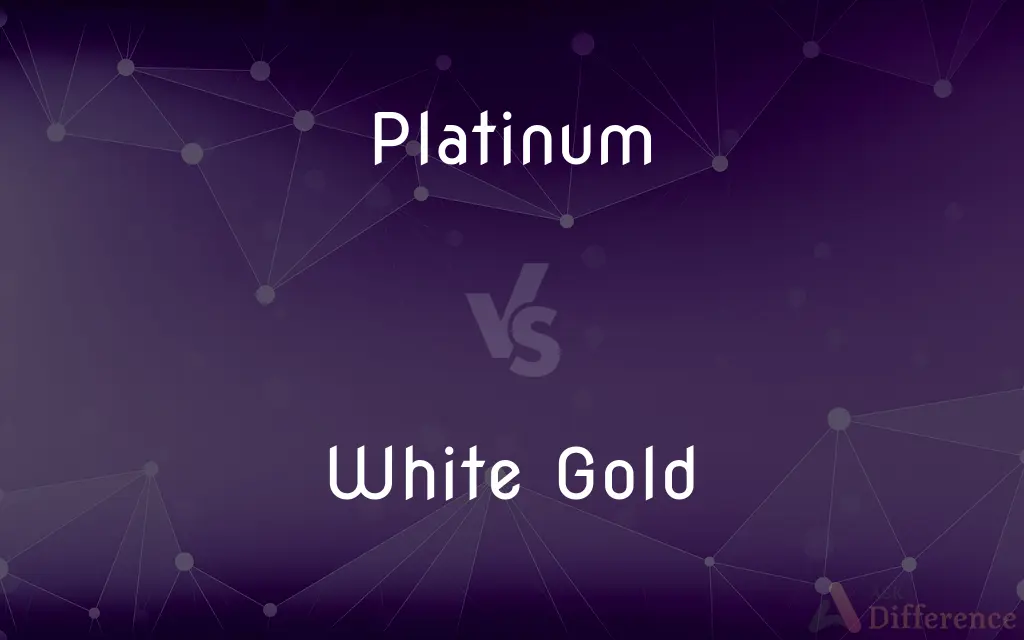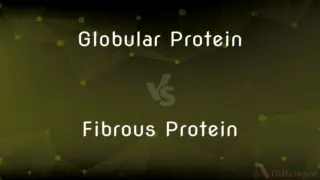Platinum vs. White Gold — What's the Difference?
By Tayyaba Rehman — Published on January 2, 2024
Platinum is a naturally white, dense, and durable metal, while white gold is an alloy of gold mixed with white metals and coated with rhodium for a white finish.

Difference Between Platinum and White Gold
Table of Contents
ADVERTISEMENT
Key Differences
Composition and Color: Platinum is a naturally occurring white metal. It is typically used in nearly pure form (95-98%) in jewelry. White gold, on the other hand, is an alloy made by combining gold with white metals such as nickel, palladium, or silver. It is often coated with rhodium for a bright white finish.
Durability and Wear: Platinum is more durable and dense than white gold, making it more resistant to scratches and wear over time. White gold, while still durable, is less resistant to scratching and wear, and its rhodium plating may wear off, requiring re-plating over time.
Weight and Feel: Jewelry made of platinum will be heavier than white gold due to its higher density. This can be a consideration in the comfort of wear, especially for items like rings or bracelets.
Cost and Pricing: Platinum is generally more expensive than white gold. This is due to its rarity, higher density, and the fact that it is used in a purer form. White gold, being an alloy, is less expensive but may incur additional costs over time for maintenance like re-plating.
Hypoallergenic Properties: Platinum is naturally hypoallergenic, making it a great option for people with sensitive skin. White gold can sometimes cause allergic reactions, especially when alloyed with nickel.
ADVERTISEMENT
Comparison Chart
Composition
Naturally white metal, 95-98% pure
Alloy of gold with white metals, rhodium plated
Durability
More durable and scratch-resistant
Less resistant to scratches, may require re-plating
Weight
Heavier due to higher density
Lighter compared to platinum
Cost
Generally more expensive
Less expensive, but with potential maintenance costs
Hypoallergenic
Naturally hypoallergenic
May cause allergies, depending on the alloys used
Compare with Definitions
Platinum
Used primarily in a pure form in jewelry.
This necklace is made of 95% pure platinum.
White Gold
Popular for its bright, white finish resembling platinum.
White gold offers the look of platinum at a more affordable price.
Platinum
Platinum is hypoallergenic, making it ideal for sensitive skin.
I chose a platinum ring as I have sensitive skin.
White Gold
Less expensive than platinum but with maintenance costs.
We chose white gold for its affordability, keeping in mind the maintenance costs.
Platinum
Heavier and denser than most other metals used in jewelry.
You can feel the quality of platinum by its weight.
White Gold
Requires occasional re-plating to maintain its color and luster.
I get my white gold bracelet re-plated every few years to keep it sparkling.
Platinum
More expensive due to its rarity and purity.
Platinum jewelry is a pricier option due to its exceptional qualities.
White Gold
An alloy of gold with white metals like nickel or palladium, often coated with rhodium.
My engagement ring is made of white gold, coated with rhodium for extra shine.
Platinum
A trademark for a certification indicating that a recording, such as an album of music, has sold a million copies.
White Gold
Can sometimes cause allergic reactions due to the metals used in the alloy.
She prefers platinum over white gold due to her nickel allergy.
Platinum
Symbol Pt A silver-white metallic element occurring in alluvial deposits in sperrylite and nickel ores, usually mixed with other metals such as iridium, osmium, or nickel. It is ductile and malleable, does not oxidize in air, and is used as a catalyst and in electrical components, jewelry, dentistry, and electroplating. Atomic number 78; atomic weight 195.08; melting point 1,768.2°C; boiling point 3,825°C; specific gravity 21.45 (20°C); valence 2, 3, 4. See Periodic Table.
Platinum
A medium to light gray.
Platinum
The chemical element with atomic number 78 and symbol Pt; a dense, malleable, ductile, highly unreactive, silverish-white transition metal of great value.
Platinum
A whitish grey colour, like that of the metal.
Platinum
(music) A single or album that has achieved platinum sales, i.e. over 1 million or 2 million.
Platinum
A platinum-based drug: a platin#Etymology 2.
Platinum
Of a whitish grey colour, like that of the metal.
Platinum
Of a musical recording that has sold over one million copies (for singles), or two million (for albums).
Platinum
Very expensive, or of very high quality
We can offer the platinum service for fifty dollars extra.
Platinum
(computer games) to reach platinum level in a game
I platinumed in Clash of Clans yesterday.
Platinum
A metallic element of atomic number 78, one of the noble metals, classed with silver and gold as a precious metal, occurring native or alloyed with other metals and also as the platinum arsenide (sperrylite). It is a heavy tin-white metal which is ductile and malleable, but very infusible (melting point 1772° C), and characterized by its resistance to strong chemical reagents. It is used for crucibles in laboratory operations, as a catalyst, in jewelry, for stills for sulphuric acid, rarely for coin, and in the form of foil and wire for many purposes. Specific gravity 21.5. Atomic weight 195.1. Symbol Pt. Formerly called platina.
Platinum
A heavy precious metallic element; gray-white and resistant to corroding; occurs in some nickel and copper ores and is also found native in some deposits
Platinum
A precious, naturally white metal known for its durability and purity.
My wedding band is made of platinum for its lasting shine and strength.
Common Curiosities
What is platinum?
Platinum is a naturally white, dense, and durable precious metal.
Does platinum scratch easily?
Platinum is durable and resistant to scratches, though it can develop a patina over time.
Can white gold tarnish over time?
White gold can lose its luster as the rhodium plating wears off, but can be re-plated.
Is platinum jewelry heavier than white gold?
Yes, due to its density, platinum jewelry is heavier.
What is white gold?
White gold is an alloy of gold with white metals, often coated with rhodium.
How often does white gold need to be re-plated?
It varies, but typically every 1-3 years depending on wear.
Why is platinum more expensive than white gold?
Platinum's rarity, higher density, and purity make it more expensive.
How can I tell if my jewelry is platinum or white gold?
Check for markings: platinum is often marked as "950 Plat" or "Pt950," while white gold may be marked with the karat and "WG" for white gold.
Why do people choose white gold over platinum?
White gold is often chosen for its lower cost and similar appearance to platinum.
Can I resize platinum and white gold rings?
Yes, both can be resized, but platinum resizing is more complex and may cost more.
Is platinum suitable for people with sensitive skin?
Yes, platinum is hypoallergenic and ideal for sensitive skin.
Can I wear white gold if I have a nickel allergy?
It depends on the alloy; some white gold contains nickel, which can cause allergic reactions.
Is white gold as durable as platinum?
White gold is durable but not as resistant to wear and tear as platinum.
Are platinum and white gold both hypoallergenic?
Platinum is naturally hypoallergenic, while white gold may cause allergies depending on the alloys used.
Does platinum require a lot of maintenance?
No, platinum requires minimal maintenance compared to white gold.
Share Your Discovery

Previous Comparison
Globular Protein vs. Fibrous Protein
Next Comparison
Damped Vibration vs. Undamped VibrationAuthor Spotlight
Written by
Tayyaba RehmanTayyaba Rehman is a distinguished writer, currently serving as a primary contributor to askdifference.com. As a researcher in semantics and etymology, Tayyaba's passion for the complexity of languages and their distinctions has found a perfect home on the platform. Tayyaba delves into the intricacies of language, distinguishing between commonly confused words and phrases, thereby providing clarity for readers worldwide.














































